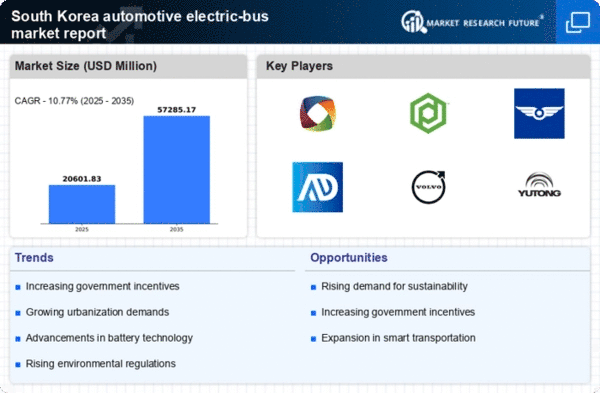The South Korea Automotive Electric Bus Market is rapidly evolving, driven by technological advancements, government regulations, and an increasing demand for sustainable public transportation solutions. With a strong push towards reducing carbon emissions and promoting electric mobility, the market is characterized by robust competition among key industry players. The South Korean government has been actively supporting this transition by providing incentives for electric vehicle purchases and investing in charging infrastructure. This dynamic landscape has prompted local manufacturers to innovate in design, performance, and battery technology, as they seek to capture market share in an increasingly eco-conscious society.
The electric bus segment, in particular, is gaining traction as cities seek cleaner alternatives for urban transport, leading to a competitive environment among both established automakers and new entrants.Hyundai Motor is a dominant player in the South Korea Automotive Electric Bus Market, leveraging its vast experience in vehicle manufacturing and innovation. The company has made significant investments in electric bus technology, enabling it to develop a range of models that cater to various needs in public transportation.
Hyundai Motor's strengths include its advanced research and development capabilities, strong supply chain management, and extensive distribution network in South Korea. The company's commitment to sustainability is evident in its ambitious plans for producing eco-friendly vehicles, which align with government initiatives aimed at reducing pollution.
As a recognized name in the automotive sector, Hyundai has been able to effectively establish partnerships with local governments and public transport operators, enhancing its market presence and ensuring a competitive edge in this sector.Kia also holds a significant position in the South Korea Automotive Electric Bus Market, focusing on creating innovative electric bus solutions that meet the evolving demands of urban transit systems. The company has developed strategic partnerships aimed at enhancing electric mobility infrastructure, thus boosting its service offerings in South Korea.
Kia's electric buses are characterized by their energy efficiency and advanced technological features, making them suitable for various applications in public transport. In addition, the company has been expanding its portfolio through collaborations that include joint ventures and alliances focused on the electrification of public transportation. Kia's strengths include a keen understanding of consumer preferences and the ability to rapidly adapt its products to reflect changing market trends. This agility, combined with its commitment to battery technology advancements, positions Kia favorably within the competitive landscape of the South Korean electric bus sector.













